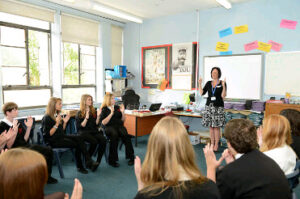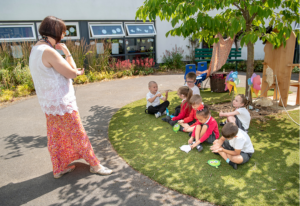While a British Sign Language (BSL) GCSE is not yet available in UK schools, our team at Signature has undertaken a 15-year process to make this possible for students in the near future.
We hope the new BSL GCSE will promote inclusivity within education and teach students valuable life skills.
If you have any queries about the qualification in British Sign Language (BSL) for secondary education, please get in touch.
Find our latest update here: GCSE in British Sign Language update – Ofqual release final consultation feedback
Take a look at the carousel below to see our journey and just how far we’ve come.

It all started with an idea. Our team at Signature was inspired to develop a BSL qualification for secondary educational facilities to offer across the UK, but we knew we had a long road ahead of us.
Here are some of the main reasons we believe a GCSE in British Sign Language is necessary:

We began researching and collating information with a working group. This group was made up of respected professionals in education and Deaf communication, as well as representatives from awarding bodies that had experience in creating qualifications for secondary education.
With the help of this working group, we wrote a draft of the qualification specification content, along with all the necessary support materials and documents needed for the next steps.

Following an overwhelmingly positive response from schools and teachers across the country, we chose six secondary schools to pilot our proposed BSL GCSE qualification.
The feedback from these schools would prove invaluable.

2017 marked the beginning of a significant campaign — the National Deaf Children’s Society (NDCS) ‘Right to Sign’. It was developed in the hope that the UK government would agree to introduce a GCSE in BSL.
It spread the word about a potential GCSE in British Sign Language and planted the seed of potential.

Our first major setback. Nick Gibbs, Minister for School Standards at the Department for Education, rejected the idea of a GCSE in British Sign Language. He believed it didn’t fit the current framework for modern foreign language offerings in secondary education.
However, we didn’t give up.
Florence from NDCS’s Young Advisory Board met with civil servants at the Department for Education and educated them on how a British Sign Language qualification could benefit young people — Deaf and hearing.
Deaf young person, Daniel Jillings, accompanied by his mum, Ann, also met with Nick Gibbs to discuss the campaign for a GCSE in British Sign Language.

TV and media presenter, Wayne Barrow, sparked the conversation of a BSL GCSE into the limelight again. He launched a successful parliament petition urging the government to make British Sign Language a part of the National Curriculum.
Wayne Barrow, as well as NDCS and the release of the Oscar-winning film, The Silent Child, all played a huge role in encouraging ongoing conversations about a potential BSL GCSE.
As a result, Daniel Jillings launched a crowdfunding campaign to cover the legal costs needed to challenge the government's delay in approving the new qualification.

Word got around.
We met with an independent regulator of qualifications and assessment, Ofqual, and the Department for Education to discuss the recent campaigns and developments in favour of a GCSE in BSL.
By the end of the meeting, we were asked to prepare two proposals to develop the qualification, which we delivered in November 2018.
At this point, the Department for Education confirmed that they were working with subject experts to develop GCSE content and aimed to introduce it to the curriculum as soon as possible.

The COVID-19 pandemic struck the world, causing delays in progress. However, the Minister for Schools and Childhood, MP Kelly Tolhurst, confirmed that work was ongoing, subject content was being drafted, and a public consultation would begin soon.

The BSL GCSE consultation began. This provided us with critical feedback on our proposal, which allowed us to refine and enhance any content requirements that would form the basis of the new GCSE.
Shortly after, the government published the consultation results and responses, with strong support in favour of the GCSE. The department received 717 responses, with views expressed about the new qualification's positive outcomes.

In October 2024, Qualifications Wales announced that it had suspended the development of its GCSE in British Sign Language in Wales. The reason was that there were too ‘many practical challenges for the educational sector as a whole’.

Ofqual provided reassurance about its ongoing work and ensured that the assessment methodology would be appropriate for a GCSE qualification in BSL.

Ofqual is still developing appropriate assessments, which have delayed the initially planned launch date of September 2025.
The Signature team is incredibly proud of the hard work undertaken up to this point. It has been an achievement for us and thousands of children across the UK.
We will continue pushing forward in our mission to deliver a British Sign Language (BSL) GCSE qualification. In the meantime, we will continue providing support through our British Sign Language courses taught at Signature-approved centres across the UK.
The BSL GCSE is a nationally recognised qualification that allows students to develop communication skills in British Sign Language. It’s suitable for secondary school students and anyone interested in learning BSL as part of their education.
Students will learn to understand and communicate in BSL across a range of everyday topics, develop cultural knowledge of the Deaf community, and gain insight into the linguistic structure of BSL.
This qualification provides an opportunity for Deaf and hearing students alike to access and celebrate BSL, promoting inclusion and better communication across communities.
Leave your Name, Email and the manner of your enquiry and member of our very helpful team will get back to you as soon as possible.